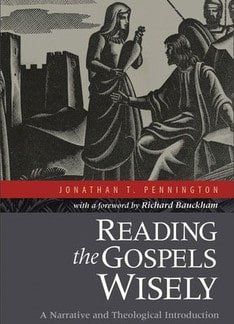Reading the Gospels wisely:
a narrative and theological introduction
Jonathan T. Pennington
Baker Academic
268 pages
£14.99
ISBN: 978-0-8010-3937-9
Star rating : 3
Jonathan Pennington is associate professor at the Southern Baptist Theological Seminary. His book discusses the nature and purpose of the four canonical Gospels and sets out a method for reading them fruitfully.
This may sound rather obvious and therefore unnecessary, yet these issues have been the subject of intensive discussion amongst New Testament scholars. For pastors and others interested in a clear exposition of the more technical issues and a well argued set of responses, this book will prove helpful.
Pennington begins by asking what kind of literature the four Gospels are, concluding that they belong to a particular type of ancient biography which focuses on the life, death and resurrection of Jesus Christ.
He then discusses questions arising from the fact that there are four Gospel accounts in the Bible rather than one, and sets out reasons why this is a help and not a hindrance to us. Finally, he embarks on the matter of reading and understanding: how can we best make use of the four accounts?
He rightly stresses the need for humility and a willingness to submit to the biblical text rather than judge it. There is a stimulating discussion of the nature of history and testimony.
Without sidelining the need for consideration of historical, literary and cultural background, Pennington argues persuasively that a proper reading of the Gospels takes most account of their context within Scripture — both within the particular Gospel itself and within the wider context of the rest of the biblical testimony.
The author warns against the ‘Whatever strikes me’ school of biblical interpretation, though his later apparent acquiescence in applications of Scripture based more in piety than careful exegesis of the text caused me some concern.
I would also like to have seen a greater emphasis on the redemptive nature of Christ’s work as key to a right understanding of the Gospel accounts.
Pennington is concerned, rightly in my view, that we have a tendency to neglect the four Gospels in favour of Paul’s letters. Throughout, he makes a plea for more time and attention to be given to the inspired accounts of Jesus’ life, death and resurrection, as standing at the very centre of the gospel.
This must be right, and Pennington’s book will be a help to pastors and others willing to tackle the sometimes complex issues that he investigates.
Robert Strivens
London Theological Seminary





